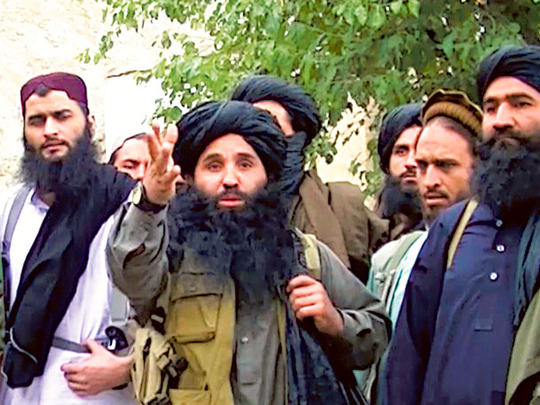
Islamabad: Once, if you wanted to speak with the man known as “Mullah Radio” you had to travel to the remote, mountainous lands of northwest Pakistan.
There, between radio segments, the man who now leads an insurgency that just killed scores of schoolchildren, would perhaps drop by on his white horse. That’s what happened when journalist Nicholas Schmidle arrived at the mullah’s compound in 2007.
At the time, the mullah named Maulana Fazlullah was riding high. Tens of thousands of people in the Swat Valley were tuning in to his illegal FM radio station, from which he excoriated the evils of female education and urged jihad. His influence was growing at such a rapid clip village women donated earrings and bangle bracelets to the cause. A cult figure was born. “He is totally out of control,” one local leader told Schmidle, who found Fazlullah particularly dangerous. “His ambitions exceeded the mere creation of an Islamic emirate in Swat,” Schmidle wrote in the New York Times.
Those ambitions, which propelled Fazlullah into the Pakistani Taliban’s top slot late last year, manifested themselves once more on Tuesday in a particularly macabre fashion: 148 students and teachers slain by Taliban gunmen on Tuesday at a school in northwest Pakistan.
By Fazlullah’s twisted logic, the attacks made sense. The killings were a response to a recent military crackdown on Taliban activities following years of ambivalent policies toward home-grown militants. They reasserted the Taliban’s presence and power to cause mayhem. But the killings also reflected Fazlullah’s desire to obliterate women’s chances to secure an education. Since 2009, Buzzfeed noted, militants have targeted more than 1,000 schools — a time frame that closely traces the rise of Fazlullah.
This isn’t Fazlullah’s first assault on education. In 2012, he claimed responsibility for an assassination attempt on Malala Yousafzai, who wrote a widely read anonymous blog describing the horrors of life under the Taliban and was this year’s Nobel Prize Peace winner. So Fazlullah allegedly dispatched a gunman who shot her in the head while she was travelling in a school van.
Fazlullah affects a different persona than some other notorious militants. He lacks the mystique of the Daesh’s Abu Bakr Al Baghdadi, who rarely makes public appearances and is reported to don a mask in the presence of subordinates. And he lacks the wild eyes of Boko Haram’s Abubakar Shekau, who grins ear-to-ear when promoting his group’s latest abomination. Rather, Fazlullah appears to be an intensely charismatic figure, more interested in publicity than combat, academic and journalistic accounts suggest.
“Fazlullah was not a born field commander and his skill lay in his ability to inspire those around him through his words,” wrote a BBC correspondent who met him. “ ... Nobody then could have predicted that he would become the head of Pakistan’s Taliban just a few years on.”
Indeed, Fazlullah’s path to the highest reaches of the barbarous militant group was improbable. Born in the mid-1970s, he grew up with the name Fazle Hayat in a simple rural family, according to a New America Foundation report. Most of his early years were spent in obscurity, working at a nearby ski lift.
But then he met a woman who would change his life. He “would have remained just a farmer’s son but for his marriage” to the daughter of a prominent insurgent, reported the Jamestown Foundation. Soon, he was no longer Fazle Hayat — he was Maulana Fazlullah. And soon after that, he became “Radio Mullah.”
What changed? He got in front of a mic.
In 2004, Fazlullah launched an unauthorised radio channel people took to calling “Maulana Radio.” His conservative, anti-American, anti-technology, anti-vaccination message resonated with the local population. “Most of the [locals] who supported Fazlullah did so only morally, but some took up arms after being inspired by his FM radio sermons, and many of these recruits were disenchanted, poor, illiterate, and unemployed youth,” according to the New America Foundation.
From this growing mass of supplicants, his drew greater power. He raised hundreds of thousands of dollars to build a two-story madrasa, later destroyed by Pakistan security forces, and he inveighed against polio vaccinations. As his sermons gave way to threats, he adopted the zeal of the religious preacher he fancied himself as.
“When I die, the angels will ask me about my actions,” he once said, according to Schmidle, writing in the New Yorker. “Will this government save me? No! I must act for myself and for my own salvation ... Are you prepared to make sacrifices?”
Fazlullah eventually came to control much of the region, waging a bloody war against the Pakistani state between 2007 and 2009. The fervour he inspired — not to mention his violent criticism of the Pakistani state — made him an attractive candidate to take over the Taliban late last year when the Central Intelligence Agency killed his predecessor, Hakimullah Mehsud, in a drone strike. Though it seemed a victory at the time, the killing elevated Fazlullah, who squashed any chance for peace negotiations with the government. “There will be no more talks,” one Taliban spokesman told the Guardian.
And then came Tuesday’s assault on the a school in a military zone in the northwestern city of Peshawar.












